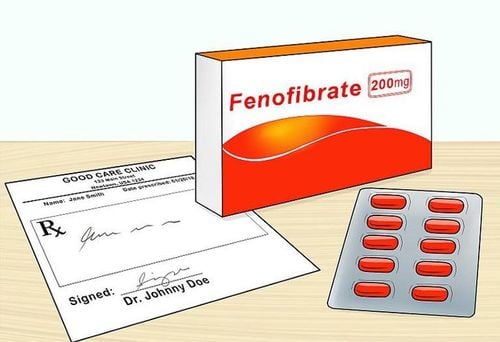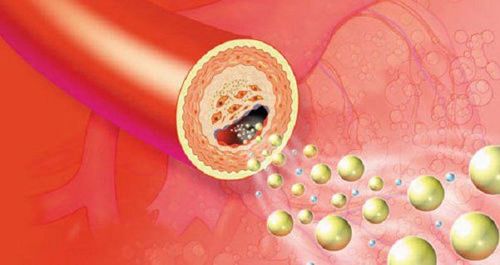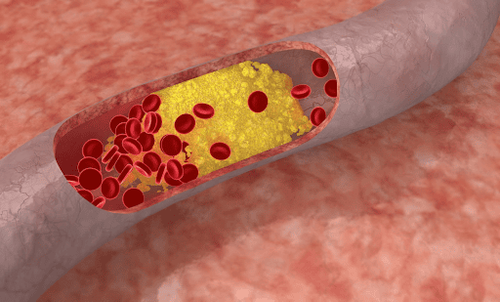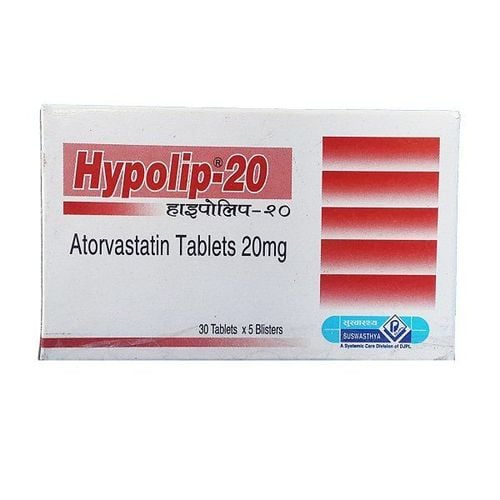This is an automatically translated article.
High blood fat (fatty blood) is a disorder of blood lipid metabolism, increasing the amount of harmful cholesterol and reducing the amount of good cholesterol for the body. This is a disease with a high risk of leading to high blood pressure, myocardial infarction, atherosclerosis, cerebrovascular accident...Signs of high blood fat Fatty blood disease develops silently, hardly cause any unusual symptoms. Therefore, when there are symptoms of high cholesterol, it means that the disease has been complicated with signs such as:
There are occasional angina attacks, short duration, disappearing on their own, without treatment but may recur. anytime. Or the patient has an uncomfortable feeling in the chest area such as being weighed down, full of pressure, suffocating, lasting from a few minutes to a few tens of minutes. Angina usually occurs with exertion and subsides with rest, may be accompanied by shortness of breath, pain radiating to one or both arms, back, neck, jaw or stomach area. There are abnormal signs such as: nausea, headache, natural sweating, dizziness, restlessness in the body, shortness of breath, nervousness, body fat but reduced working capacity, often tired . There is a yellow rash under the skin, nodules as big as fingertips, pale yellow, glossy surface, growing on the skin of the eyes, elbows, back, chest, thighs, heels, ... painless and not itchy. .

Cơn đau thắt ngực là một biến chứng của tình trạng mỡ máu cao
Four indicators of high blood lipids When there are signs of suspicion of high cholesterol, patients need to have lipid components tested to check cholesterol and triglyceride levels in the blood to diagnose the disease. Blood samples are usually taken in the morning, on an empty stomach, about 3ml of blood is taken. When testing blood lipids, patients need to pay attention to the following blood fat index results:
1. Increase in total cholesterol Cholesterol is a fatty substance found in the cell membranes of all tissues in the body and is transported in human plasma. Cholesterol is a major structural component of cell membranes, nerve fibers and hormones in the body. In addition, cholesterol also helps the liver produce bile acids that help the body digest food.
Total cholesterol test is indicated for patients with dyslipidemia, atherosclerosis, nephrotic syndrome, hypertension or performed to check the health periodically for people who are obese or over 40 year old.
Total cholesterol in normal people is 3.9-5.2 mmol/l. High cholesterol is a sign that the patient has high cholesterol or other diseases such as nephrotic syndrome, extrahepatic biliary jaundice, atherosclerosis,...
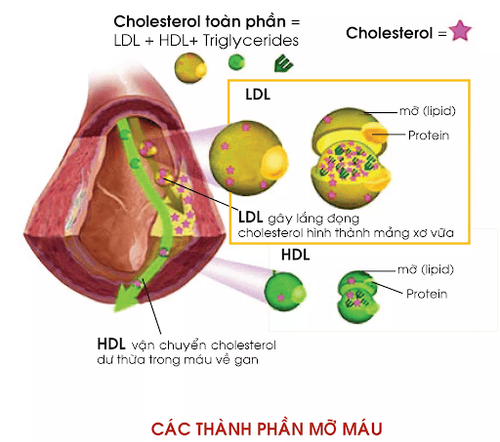
Xét nghiệm các thành phần mỡ máu giúp chẩn đoán tình trạng rối loạn mỡ máu
The triglyceride index in a normal person is 0.5-2.29 mmol/l. If the triglyceride index is higher than this level, it will strengthen the diagnosis of patients with fatty blood, atherosclerosis, obesity, diabetes, nephrotic syndrome.
3. Increased LDL-cholesterol Cholesterol combines with LDL-c (bad cholesterol for the body) to transport cholesterol into the blood, seep into the vessel walls, forming atherosclerotic plaques. LDL-cholesterol test is usually indicated for patients with dyslipidemia, atherosclerosis, coronary artery disease, diabetes, hypertension,...
Normal LDL-cholesterol index is 3.4 mmol/ l. An increase in LDL-cholesterol warns of high cholesterol, atherosclerosis, obesity,...
4. Lowering HDL-cholesterol Cholesterol combined with HDL-c (good cholesterol for the body) works against atherosclerosis by carrying excess cholesterol from the vessel walls back to the liver. HDL-cholesterol test is usually ordered for patients with dyslipidemia, hypertension, atherosclerosis or for periodic health checks for people over 40 years old.
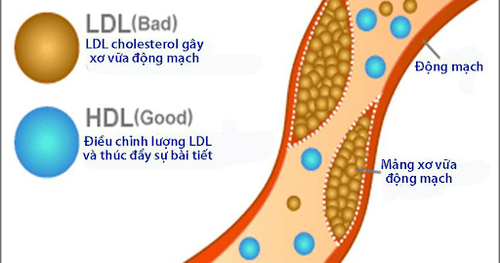
HDL-cholesterol giảm là dấu hiệu cảnh báo mỡ máu cao
Normal HDL-cholesterol is ≥ 0.9 mmol/l. HDL-cholesterol reduces the warning of fatty blood disease, atherosclerosis, hypertension, angina,...
How to screen for high cholesterol? From the fact that it occurs in patients with high cholesterol, it shows that this disease progresses quite quietly, when there are symptoms, it often warns that the disease has progressed to a severe stage, with complications and difficult to effectively treat. Therefore, each person should perform a periodical general health check-up to understand their own health status and take appropriate measures when suffering from a number of diseases such as fatty blood, diabetes, heart disease. vascular, cancer,...
Vinmec International General Hospital is currently providing Packages of health screening, general health examination including clinical examination, blood, urine, stool, tissue, diagnostic tests. With the package of general health check-up, the patient will be fully recorded with health information, helping the treating doctor to have enough means for early detection. timely intervention and treatment, minimizing complications of serious diseases. Not only that, but diagnostic tests also allow doctors to evaluate the effectiveness of treatment to continue with the old method or choose better therapies.
Please dial HOTLINE for more information or register for an appointment HERE. Download MyVinmec app to make appointments faster and to manage your bookings easily.




